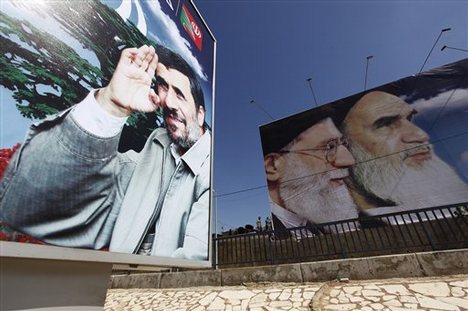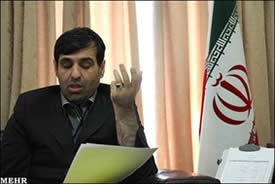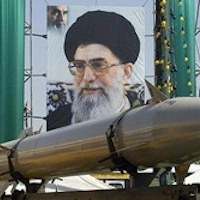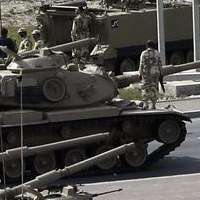![]()
Sun, July 10, 2011 | The Meir Amit Intelligence and Terrorism Information Center

Posters, from left, show Iranian President Mahmoud Ahmadinejad, current Supreme Leader Ali Khamenei and Ayatollah Ruhollah Khomeini
Iran: strong reactions to President Ahmadinejad’s statement following arrests of his allies
The law, not the government, is the “red line”: strong reactions to president’s statement following arrests of his allies
A statement made by President Ahmadinejad following the arrests of his allies triggered strong reactions from his political opponents earlier this week. Wednesday (June 29), the president said that the arrests were politically motivated and designed to exert pressure on his government. He warned that if members of his government were arrested, he would break his silence and utilize his legal powers to protect his supporters.
Majles member Ali Motahari categorically rejected the president’s argument about the arrests being politically motivated, saying that his remarks reflected his negative attitude towards the judiciary. He noted that the regime, the political groups, and the people of Iran had the president’s best interests in mind and sought to steer him away from the influence of the “deviant faction”. The president must choose between the values of the Islamic revolution and the opposite values represented by his ally, Rahim Masha’i, Motahari said. He further added that Ahmadinejad’s remarks on the government being a red line not to be crossed made no sense, since the red line should be the law and the values of the revolution, rather than the president’s friends and supporters (Tabnak, July 1).
The judiciary also rejected the president’s remarks. Commenting on Ahmadinejad’s statement, Mohammad Ja’far Montazeri, head of the Administrative Justice Court, said that the judiciary has no “red line” in its fight against lawbreakers, and that setting such a line would be meaningless for the judiciary (ILNA, July 4).
Iran’s media also voiced strong negative reactions to the president’s remarks. Alef, a website close to Ahmad Tavakoli, chairman of the Majles Research Center and one of the president’s most prominent opponents in the conservative camp, sharply criticized Ahmadinejad’s announcement, citing it as proof that he does not live up to the slogans he had promoted during the presidential race on the need to fight corruption in Iran. Ahmadinejad, who used to accuse his opponents of corruption, is now taking a stand against the judiciary and Majles members working to expose those members of his inner circle involved in corruption, going as far as to threaten them. The website called on the judiciary to continue its fight on corruption despite the president’s remarks and without fear of his threats (Alef, July 2).
Asr-e Iran, a website affiliated with the pragmatic conservative bloc, also strongly condemned the president for his remarks. An editorial published by the website said that not even Ali bin Abi Talib, the first Shi’ite imam, considered himself above the law or saw himself as a red line not to be crossed.
There is nothing wrong for a manager to back and protect his people, the article said. Such backing, however, must not be absolute, nor should it go beyond the bounds of the law. What’s more, it is inconceivable that the president should choose to protect a select few government ministers from the judiciary and not give his backing to other members of the government facing impeachment by the Majles.
The president’s claim about his government being a “red line” has no religious, legal, or juridical basis, the article said. Even Imam Ali agreed to stand trial following a conflict with a Jew who had stolen from him, and was even willing to be sentenced if found guilty by the court. He did not argue that, as representative of the Prophet and leader of the Muslim community, it was inappropriate for him to stand trial with a Jew. In another instance, the imam refused to protect his own family from the law. The Iranian constitution mandates that all are equal before the law, Asr-e Iran said, and it cannot be argued that government members are not subject to the law or immune to lawsuits (Asr-e Iran, July 1).
The daily Ebtekar argued that the president should use his legal powers to protect all the citizens of Iran, not just members of his government. An editorial published by the daily following the president’s remarks said that granting immunity to government members is illegal and unjustified, and that the president should have announced that any senior official was subject to legal action if there was proof to find them guilty. It is reasonable to expect the president to draw the line at violation of the law rather than action against members of his government, and to personally expose and dismiss senior officials involved in corruption (Ebtekar, July 2).
The conservative daily Siyasat-e Rooz argued that, for the revolution and the regime, Islam — not the government — is the “red line”. Protecting the government is a major task for any president, said an editorial published by the daily, but the argument about the government being a red line is President Ahmadinejad’s own innovation. The judiciary is an independent branch that operates in accordance with the law, and it cannot be accused of being politically motivated. It would have been best for Ahmadinejad to treat Islam, the regime, the Supreme Leader, and the law, rather than his government members, as “red lines”, the article said (Siyasat-e Rooz, July 2).
The daily Jomhuri-ye Eslami also reacted sharply to the president’s remarks, arguing that the Iranian people had never allowed a president to divide the citizens of Iran into three classes: third-class citizens who are not government members and whose lives do not matter; second-class citizens who are members of the government, investigation against which — even on matters of economic corruption — is considered by the president as a reflection of political struggle; and first-class citizens, also members of the government, with the president contending that the judiciary crosses a red line by pursuing an investigation against them (Jomhuri-ye Eslami, July 2).
Sun, July 03, 2011 | The Meir Amit Intelligence and Terrorism Information Center
Internal political struggles within the conservative camp: arrests of Ahmadinejad’s allies continue
The struggle waged by the traditional-conservative establishment against the allies of President Ahmadinejad and his office chief Rahim Masha’i (referred to as the “deviant faction”) has entered a new phase in recent days with the arrests of some of them.
Mohammad Sharif Malekzadeh, one of Rahim Masha’i’s allies and chairman of the High Council of Iranian Expatriates’ Affairs, was arrested last weekend, only days after Majles members had forced him to resign as deputy foreign minister for administrative and financial affairs. Malekzadeh had been appointed to the post early last week by Foreign Minister Ali-Akbar Salehi, but was forced to submit his resignation only three days later following strongly critical reactions from Majles members, who went as far as to threaten to impeach the foreign minister in protest of the appointment. The Majles members claimed that Malekzadeh was suspected of involvement in economic corruption affairs.
Also arrested in recent days were Ali Asghar Parhizkar, head of the Arvand Free Trade Zone on the Persian Gulf coast; and Ali Reza Moghimi, head of the Aras Free Trade Zone in East Azerbaijan province.
Fars News Agency reported that Parhizkar was accused of abusing his status to transfer funds towards the activity of the “deviant faction”. According to the news agency, the senior official was also involved in running a company engaged in illegal economic activity, also with the purpose of promoting the economic interests of those affiliated with the political faction (Fars, June 26). Moghimi, who was appointed as head of the Aras Free Trade Zone by Hamid Baqa’i, the president’s top advisor, is also accused of being involved in economic corruption (Fars, June 25).
In recent weeks, the Iranian media reported that nearly 30 people close to Ahmadinejad have been arrested. In addition, a growing number of voices are calling to arrest Masha’i himself. This week judiciary spokesman Gholam-Hossein Mohsen Eje’i announced the possibility of further arrests of government officials involved in corruption affairs being investigated by the judiciary. In an interview given to Mehr News Agency, Eje’i noted that the affairs under investigation involve the high Council of Iranian Expatriates’ Affairs and the Free Trade Zone Organization (Mehr, June 26).
The conservative daily Javan defined the recent arrests as a new stage in the legal struggle waged against the “deviant faction”. An editorial published by the daily said that Malekzadeh and Parhizkar had attempted to take advantage of their status to expand the influence of the “deviant faction”. The daily argued that the faction had tried to prevent Malekzadeh’s arrest by appointing him as deputy foreign minister. According to Javan, the arrests of these officials and the exposure of their involvement in economic corruption will likely exacerbate the predicament and isolation of the “deviant faction” (Javan, June 26).
Commenting for the first time on the wave of arrests of his allies, President Ahmadinejad said that the arrests were motivated by political interests and designed to put pressure on the government. Speaking at a press conference held Wednesday, the president said that while he had remained silent on the arrests of his allies until now, he would utilize his legal powers to protect his supporters in case of an attempt to act against members of his government (Mehr, June 29).
Media affiliated with the president’s critics in the conservative bloc reported that the president had disregarded established protocol and was conspicuously absent from a meeting held earlier this week between Supreme Leader Ali Khamenei and Afghanistan’s President Hamid Karzai (www.digarban.com, June 26).
Meanwhile, Hojjat-ol-Eslam Mojtaba Zolnour, who retired last week from his post as the Supreme Leader’s Revolutionary Guards representative, argued that members of the “deviant faction” began preparing for the Majles elections slated for early 2012, and that the preparations include contacts with reformist opposition elements and large investments. He noted that the “deviant faction” espouses religious ideas that go against the concept of “rule of the religious jurisprudent”, and that it is more dangerous than all the political factions that have operated since the Islamic revolution, including the Nationalist-Religious faction, the reformists, the Mojahedin-e Khalq, and the Hojjatiyeh faction (Khabar Online, June 26).



 RSS
RSS




















#Iran: strong reactions to President #Ahmadinejad’s statement following arrests of his allies | http://bit.ly/qCV1CP
#Iran: strong reactions to President #Ahmadinejad’s statement following arrests of his allies | http://bit.ly/qCV1CP
#Iran: strong reactions to President #Ahmadinejad’s statement following arrests of his allies | http://bit.ly/qCV1CP